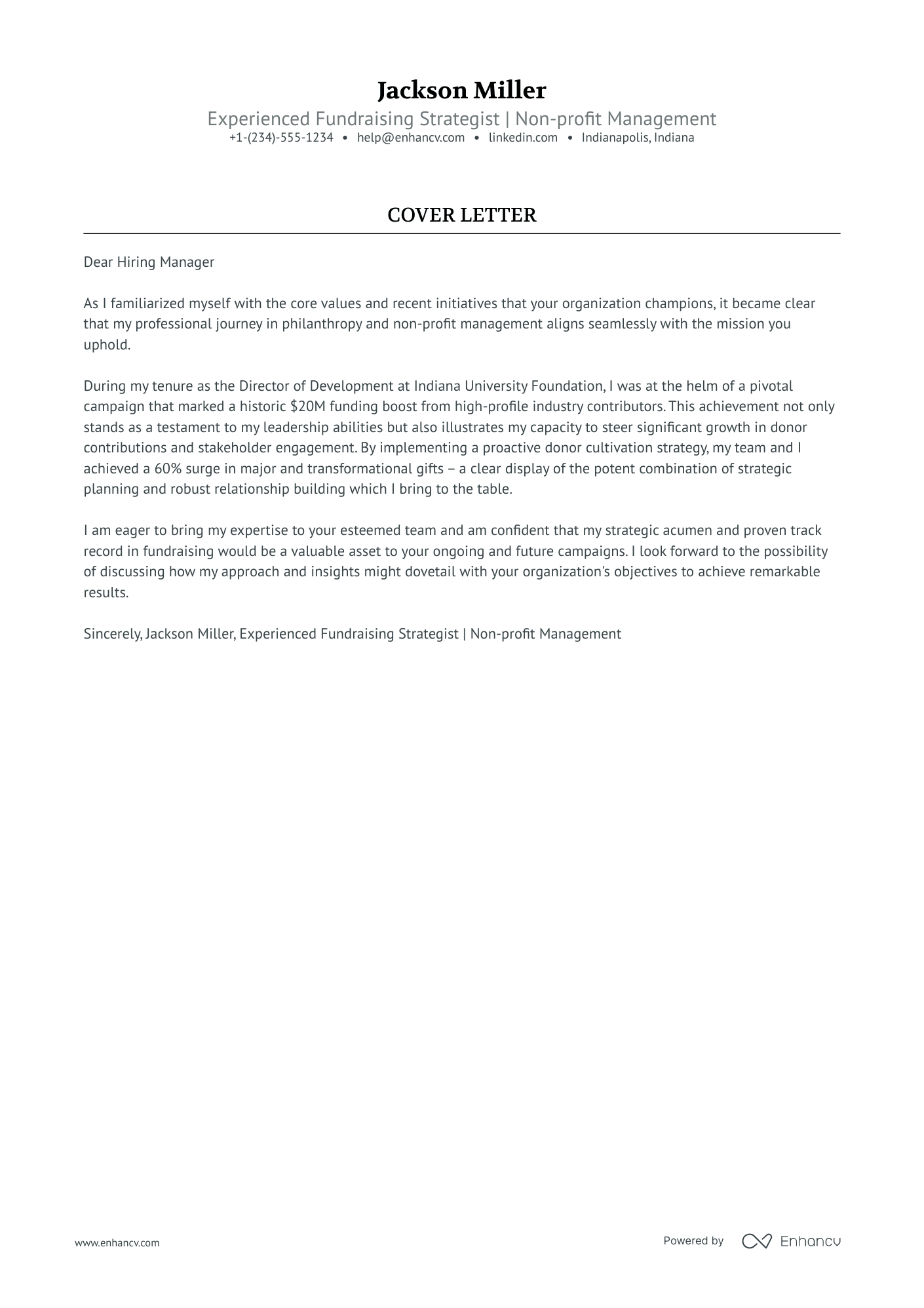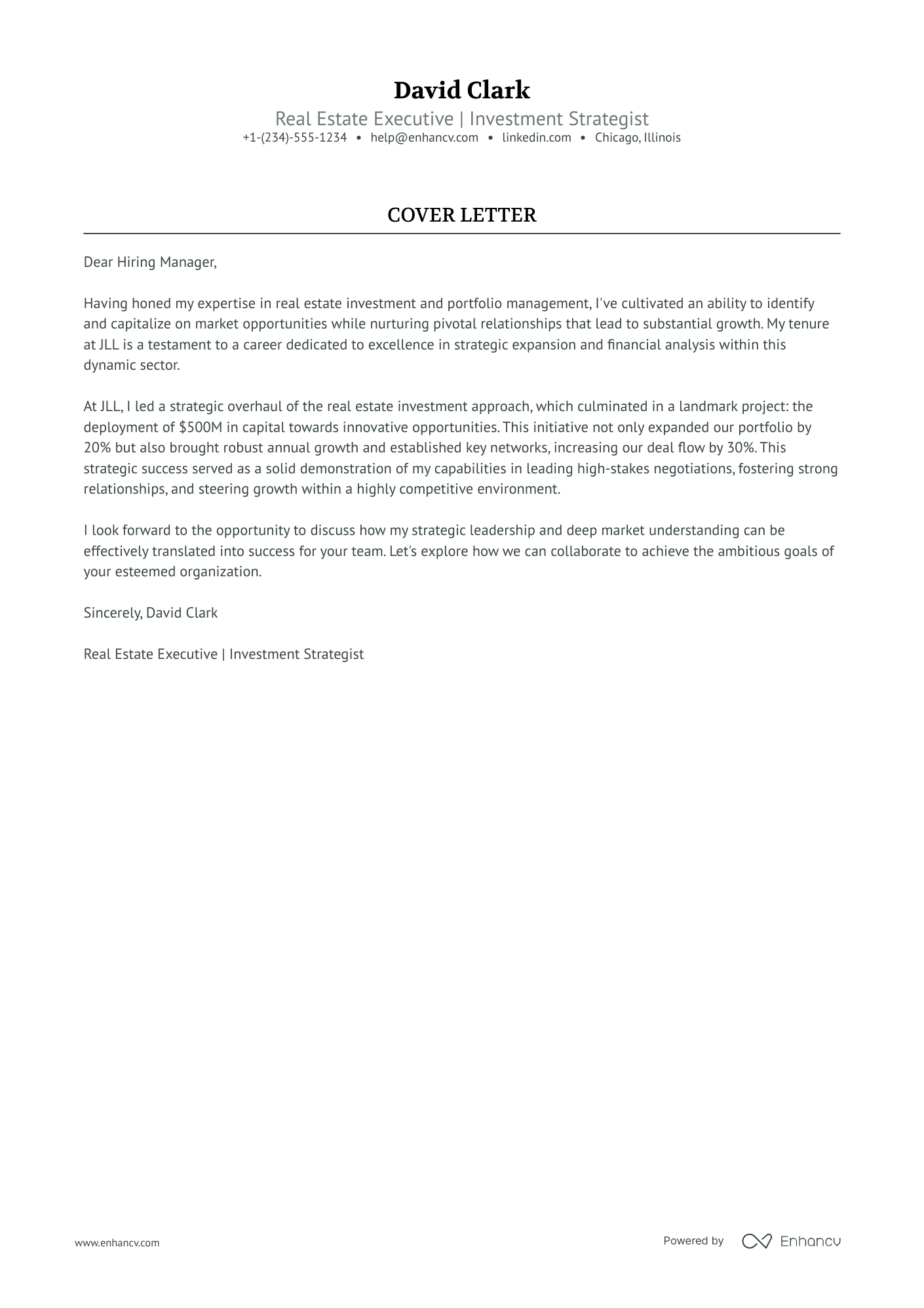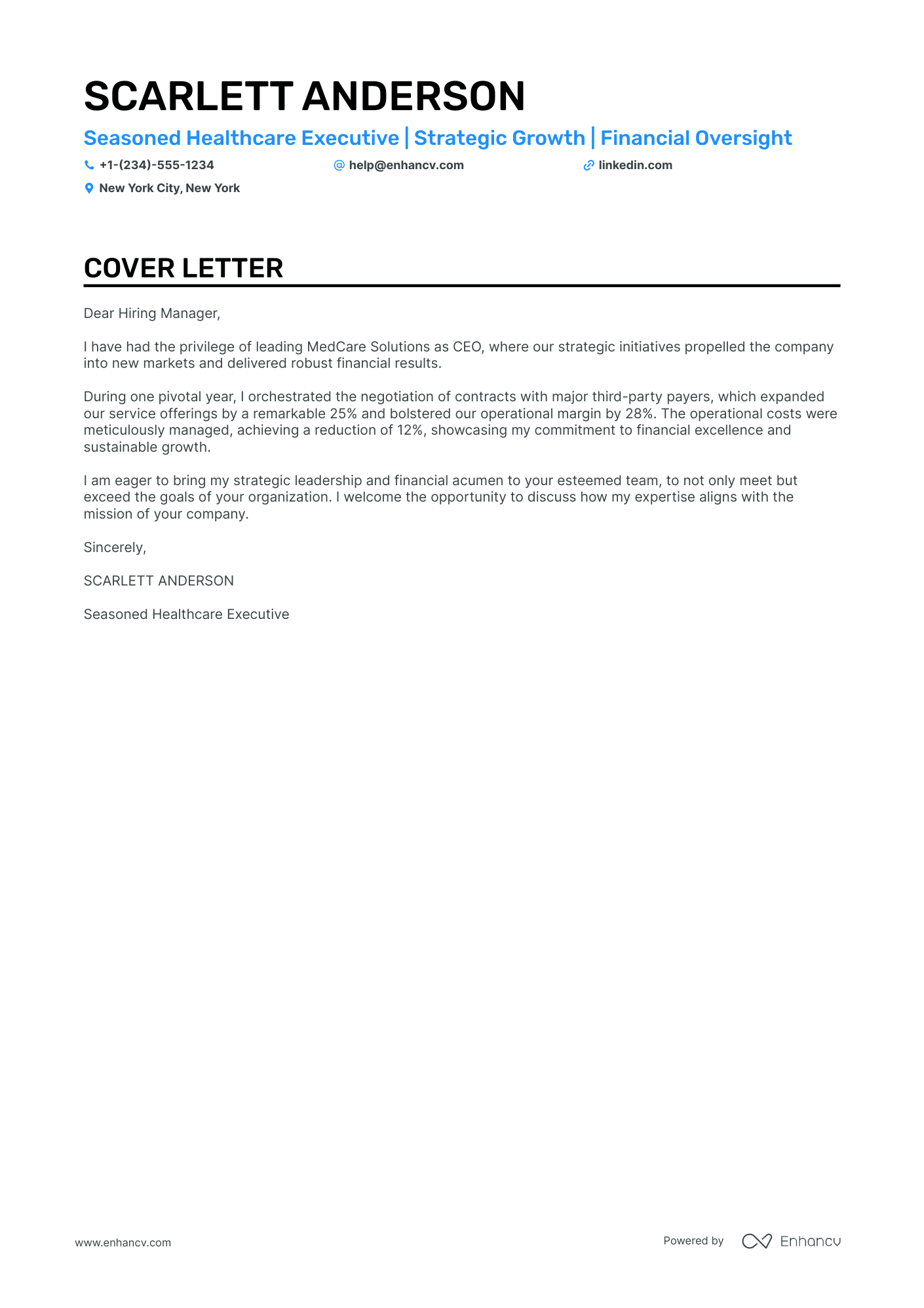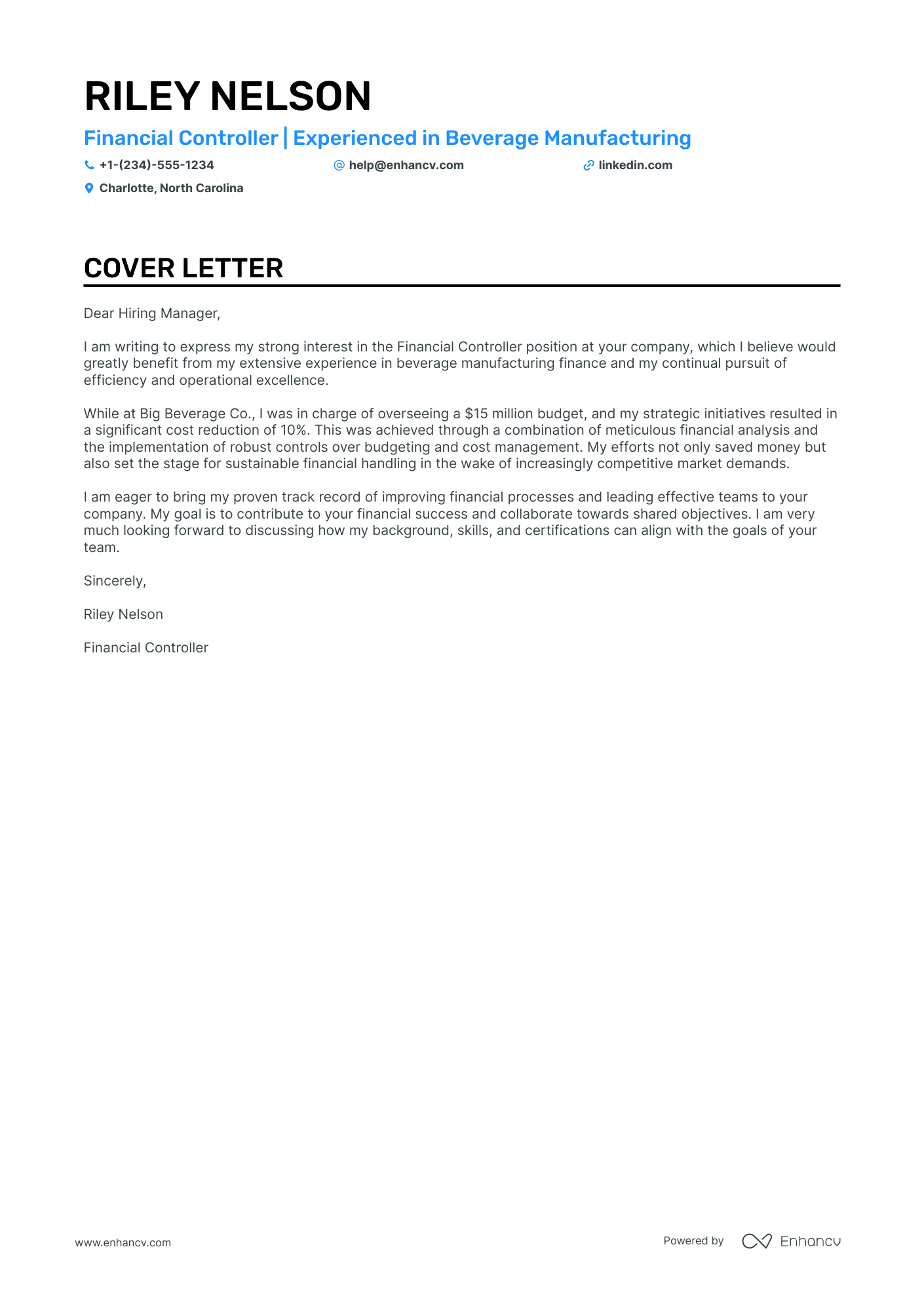Crafting a chief executive officer cover letter can be daunting, especially after diving headfirst into the job market. Amidst the flurry of updating your resume and scouting for opportunities, it's crucial to realize that your cover letter is not a resume echo. It's your chance to weave a narrative around your crowning professional accomplishment—without resorting to overused phrases. Strike the perfect balance of formality and personal touch in a concise, one-page testament to your unique leadership journey.
- Write a chief executive officer cover letter that helps you stand out (and get the job);
- Understand how to start and end your chief executive officer cover letter with the appropriate greeting;
- What to include in the body of your chief executive officer cover letter to put your best foot forward;
- Your most important achievements - how to present them as part of your chief executive officer cover letter.
And if you want to make your life even easier, simply drag and drop your chief executive officer resume into Enhancv's AI cover letter generator, and it will write your cover letter for you in just a few moments.
If the chief executive officer isn't exactly the one you're looking for we have a plethora of cover letter examples for jobs like this one:
- Chief Executive Officer resume guide and example
- Assistant Director cover letter example
- Senior Executive Assistant cover letter example
- Deputy Director cover letter example
- IT Director cover letter example
- Regional Director cover letter example
- Board of Directors cover letter example
- Assistant Manager cover letter example
- Director of Finance cover letter example
- Executive Director cover letter example
Drop your resume here or choose a file.
PDF & DOCX only. Max 2MB file size.
Chief executive officer cover letter example
Taylor Foster
San Francisco, CA
+1-(234)-555-1234
help@enhancv.com
- Emphasize Relevant Experience: The cover letter specifically highlights the candidate's experience as a Chief Operating Officer at Salesforce, which is directly relevant to the role they are applying for. This demonstrates to the hiring manager that the candidate has held a high-level position and has experience with significant responsibilities.
- Quantify Achievements: The candidate quantifies their achievements, such as improving retention rates by 35% and cutting costs by $20M. This provides concrete evidence of their capabilities and makes their accomplishments more impressive and credible to the hiring manager.
- Align with Company Goals: By mentioning the company’s strategic goals and showing how their past work aligns with those objectives, the candidate shows that they have done their homework and are genuinely interested in the company's success, not just any job.
- Call to Action: The cover letter closes with a call to action, expressing enthusiasm for discussing how the candidate’s background aligns with the company's needs and objectives, which sets the stage for the next step in the hiring process.
What about your chief executive officer cover letter format: organizing and structuring your information
Here is one secret you should know about your chief executive officer cover letter assessment. The Applicant Tracker System (or ATS) won't analyze your cover letter.
You should thus focus on making an excellent impression on recruiters by writing consistent:
- Header
- Greeting
- Introduction
- Body paragraphs (and explanation)
- Promise or Call to action
- Signature (that's optional)
Now, let's talk about the design of your chief executive officer cover letter.
Ensure all of your paragraphs are single-spaced and have a one-inch margins on all sides (like in our cover letter templates).
Also, our cover letter builder automatically takes care of the format and comes along with some of the most popular (and modern) fonts like Volkhov, Chivo, and Bitter.
Speaking of fonts, professionals advise you to keep your chief executive officer cover letter and resume in the same typography and avoid the over-used Arial or Times New Roman.
When wondering whether you should submit your chief executive officer cover letter in Doc or PDF, select the second, as PDF keeps all of your information and design consistent.
Why spend hours writing a cover letter? Our free cover letter generator can do it for you in seconds.
The top sections on a chief executive officer cover letter
- Header: This section includes the candidate's contact information, the date, and the recipient's details, establishing the necessary formalities and making it easy for the recruiter to correspond with the candidate.
- Opening Greeting: A personalized greeting addressing the recruiter or the hiring manager by name shows professionalism and attention to detail, which reflects well on a CEO candidate's interpersonal skills.
- Executive Summary: The summary should highlight the candidate's overarching management philosophy, significant leadership successes, and industry experience, positioning them as a strategic fit for the CEO role.
- Leadership and Vision: This section should showcase the candidate's ability to lead through past achievements, demonstrating their capacity to steer the company toward a prosperous future with a clear and compelling vision.
- Closing Statement: The candidate should reiterate their interest in the position and propose a follow-up meeting, emphasizing their readiness to contribute to the company's success and expressing confidence in their ability to fulfill the obligations of a CEO.
Key qualities recruiters search for in a candidate’s cover letter
- Strategic vision and foresight: CEOs must possess the ability to set the strategic direction of the company, foreseeing market trends and positioning the organization for long-term success.
- Proven leadership and people management skills: Leading an organization requires the ability to inspire and manage a diverse team, ensuring high morale, productivity, and retention.
- Strong financial acumen: CEOs need to understand complex financial concepts to make informed decisions that will impact the fiscal health of the business.
- Experience in driving growth and innovation: An established track record in expanding a company's market share and spearheading innovative initiatives is critical for a CEO.
- Decision-making ability under pressure: The role demands making tough decisions quickly and effectively, often under stressful conditions, to guide the company successfully.
- Excellent stakeholder communication and engagement: Effective communication with board members, investors, employees, and other stakeholders is essential for building trust and alignment with the company's vision and goals.
How to personalize your chief executive officer cover letter greeting
Before you start writing your chief executive officer cover letter, take the time to find out who is recruiting for the role.
Search for the recruiter's name on LinkedIn or the corporate website to address them personally in your chief executive officer cover letter salutation.
What if you can't find out who's recruiting for the role?
Always aim to avoid the very impersonal "Dear Sir/Madam" - instead, opt out for "Dear HR Team" or "Dear Hiring Manager" to make a better first impression.
List of salutations you can use
- Dear Hiring Manager,
- Dear [Company Name] Team,
- Dear [Search Committee or Department Name] Chair,
- Dear Mr./Ms./Dr. [Last Name],
- Dear Members of the [Company Name or Team Name] Selection Committee,
Your chief executive officer cover letter intro: showing your interest in the role
On to the actual content of your chief executive officer cover letter and the introductory paragraph.
The intro should be no more than two sentences long and presents you in the best light possible.
Use your chief executive officer cover letter introduction to prove exactly what interests you in the role or organization. Is it the:
- Company culture;
- Growth opportunities;
- Projects and awards the team worked on/won in the past year;
- Specific technologies the department uses.
When writing your chief executive officer cover letter intro, be precise and sound enthusiastic about the role.
Your introduction should hint to recruiters that you're excited about the opportunity and that you possess an array of soft skills, e.g. motivation, determination, work ethic, etc.
The middle or body of your chief executive officer cover letter body: a great instrument to tell a story
Now that you've set the right tone with the greeting and introduction of your chief executive officer cover letter, it's time to get down to business.
Hear us out, the body of your chief executive officer cover letter is the best storytelling instrument you have, in your job-hunting arsenal.
Writing the next three to six paragraphs, take the time to reassess the advert to discover job-crucial requirements.
Next, choose one accomplishment that covers those key skills and talents.
Use precisely that achievement to tell an exciting story of how you match the ideal candidate profile.
In the undertones of your story or chief executive officer cover letter body, hint at the difference you'd make and sell your application as the perfect one for the job.
Ending your chief executive officer cover letter: a closing paragraph with a promise
If you're thinking of finishing your chief executive officer cover letter with a "Sincerely yours" or "Thanks for the consideration," you need to read on.
End the final paragraph of your chief executive officer cover letter with a twist:
- a promise - of how you'd grow as a professional, part of the company, or improve organizational metrics;
- a call to action - prompt interviewers with some follow-up actions if they are interested in your profile.
A personalized ending would surely help you to stand out by being a memorable candidate.
Addressing limited to no experience in the chief executive officer cover letter
There's nothing to worry about if you lack professional experience.
Your chief executive officer cover letter could bridge the gaps in your professional history by focusing on what matters most to recruiters, that's either:
- skills - focusing on transferable ones you've gained, thanks to your life experience (e.g. volunteering, certificates, etc.);
- achievements - select the most relevant and noteworthy one from your history (e.g. education, projects, etc.);
- motivation - describe how you envision your professional growth in the next up to five years, thanks to this opportunity.
Key takeaways
Winning recruiters over shouldn't be difficult if you use your chief executive officer cover letter to tell a story that:
- Is personalized by greeting your readers and focusing on key job skills greets;
- Isn't spread all over the place, but instead focuses on one key achievement and selling your value as a professional;
- Introduces your enthusiasm for the role, passion for the job, or creativity in communication;
- Is also visually appealing - meeting the best HR practices;
- Ends with a nod to the future and how you envision your growth, as part of the company.
Chief Executive Officer cover letter examples
By Role













